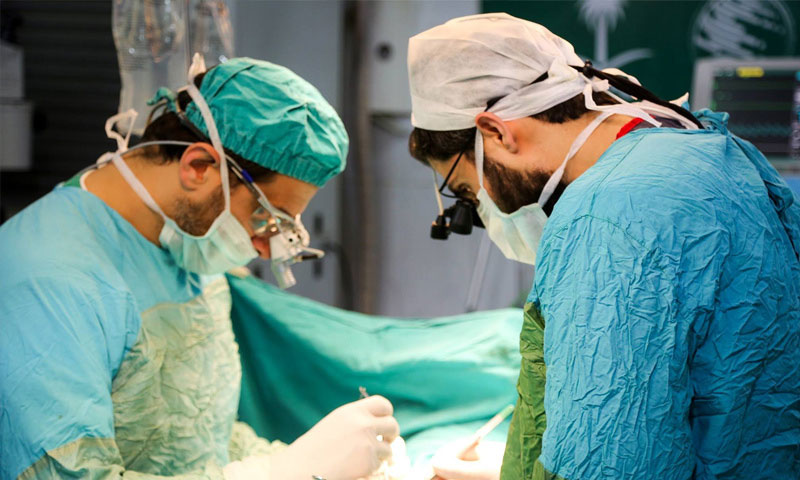Dr. Talal Abdullah expressed his optimism that the working environment in the field of medicine is bound to improve in Idlib governorate. Dr. Abdullah’s remarks come after the competent authorities began regulating the work of medical staff, in all specialties, by requiring that they acquire licenses to practice medicine.
Dr. Abdullah, the medical director at Ibn al-Haytham Ophthalmology Hospital in the town of Harim in Idlib governorate, started the procedures for obtaining a work license, he told Enab Baladi. Dr. Talal is one of many who are working on acquiring their license after a resolution was issued by the Health Directorate of Idlib on March 7, 2019, requiring that medical professionals obtain licenses to practice.
With the support of local and international groups, the Directorate has managed to maintain its independence after the Salvation Government took over from the Interim Government, with whom the Directorate had previously coordinated.
Regulating the Medical Sector
The Health Directorate’s resolution states that no one may practice the professions of medicine, dentistry, pharmacy, midwifery, nursing or technical assistance without a certificate in their respective field. Another requirement is that medics must be registered with the Directorate of Health and licensed to practice the profession, permanently or temporarily.
Commenting on the goals of the decision, deputy director of Idlib’s Directorate of Health, Mustafa al-Eido, said in an interview with Enab Baladi that the decision aims mainly to regulate the work of the medical staff in Idlib, which falls outside the Syrian regime’s control. The decision was also made as an attempt to detect doctors and nurses and other medics who hold forged certificates and bar them from working in the medical field.
Al-Eido revealed that 238 licenses were issued between the date on which the decree was adopted and the month of June for medical staffers of different specialties.
Dr. Talal Abdullah, who owns a private clinic in the town of al-Dana, said that the decision will make a difference in the medical field in Idlib. The extent of its success, he added, is hard to assess at the moment.
In an interview with Enab Baladi, Dr. Abdullah added that the desired outcome is protecting the medical field against fraud and false doctors, which is a commonplace in the areas that fall outside the Syrian regime’s control in Idlib, something that has caused a negative impact on patients, he said.
Licensing Requirements
The medical sector, which has endured shelling, kidnapping of doctors and the siege, is faced with several challenges and violations as a result of the conditions of war and armed conflict that have beset the governorate for many years.
Despite the many challenges facing the medical development in Idlib, al-Eido, the deputy director of Idlib’s Directorate of Health, said that the medical situation in the region is “an achievement,” stressing that “it is significantly more developed compared to the Syrian regime’s areas of control, as well as how things were in the past in Idlib.”
He considered that the decision to grant licenses to medical practitioners is an achievement the Directorate is keen on turning into a reality in the medical sector, by imposing “reasonable” requirements on workers in this sector.
These requirements include that physicians, dentists, pharmacists, midwives, nurses, and technical assistants should hold certificates, whose definitions are cited in the regulation, from a Syrian or foreign university. They also ought to be registered with their relevant union, and a resident of Syria.
Medical practitioners are also required to present a number of documents to earn a license, which are: a union document, a written application, a certified copy of their degree, a copy of their ID, three personal photographs, a signed pledge stating that the provided documents are valid, a letter from the institution in which they work, and a medical clearance.
According to the regulation, the Directorate retains the right to revoke the license of any medical worker should they suffer an illness that results in them losing their medical competence, partially or wholly, or if they tarnish the image of the profession.
Nonetheless, Dr. Abdullah believes that the medical sector in Idlib needs many similar regulations, most pressingly improving and developing the capacities of the medical staff, and helping those who have not had the opportunity to complete their studies in medicine due to displacement and security restrictions.











